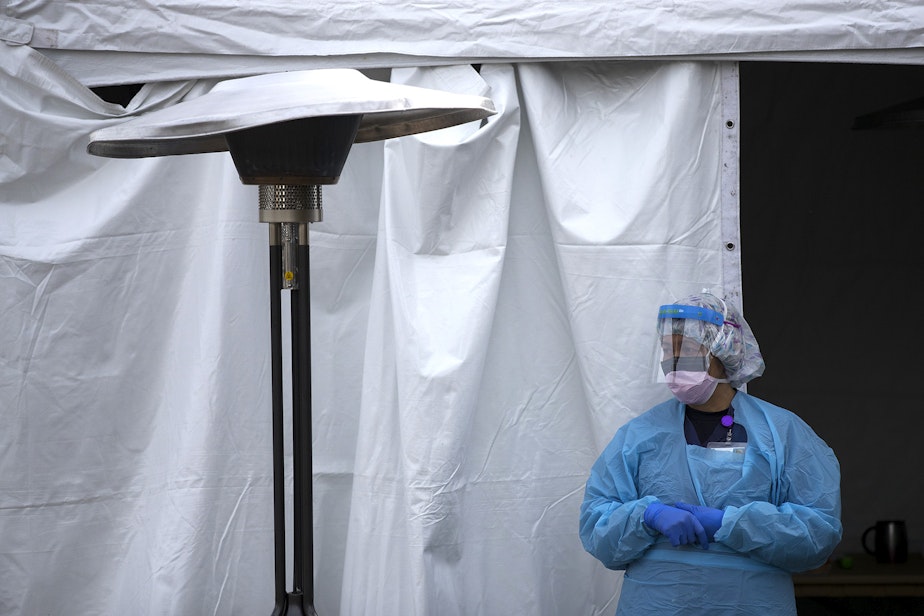Here's how Washington state health care workers are collecting medical equipment donations

Washington State can’t fill all the medical supply orders it's getting from health care providers. Now, health workers and their labor unions are collecting them instead.
Washington state health care workers are launching an online drive to collect donations of much-needed personal protective equipment, such as N-95 masks, gloves, and medical gowns.
They’re reaching out to other industries for help.
“We know there is a shortage in this state and felt like there are people out there who work in construction trades, dentist’s offices, insulation companies who might have the kind of masks and gloves that health care workers desperately need in this moment on the front lines,” said Sarah Cherin, Chief of Staff of UFCW21, a union that represents many health care workers across the state.
Meanwhile, Washington state is still waiting for the federal government to approve the state's third request for medical supplies from the nation’s strategic national stockpile.
The state Department of Health made its latest request on Friday, March 13, and it was still in the queue as of Thursday, March 19, according spokesperson Lisa Stromme Warren.
Sponsored
In particular, the state is asking for 64,690 N-95 masks, 154,103 surgical masks, 29,344 face shields, and 23,925 gowns.
Two previous requests to the federal government yielded, over 360,000 N-95 respirators, more than 500,000 surgical masks, and gowns, face shields, and gloves. But state officials received just 25% of what was asked for, according to Stromme Warren.
Sponsored
As of Tuesday afternoon, the Washington State Department of Health had filled 54 of the 543 requests for protective equipment it had received.
“Know that huge teams of people are working day and night toward obtaining supplies,” Stromme Warren wrote in an email.
Some hospitals in the state taking care of COVID-19 patients are warning they may run out of personal protective equipment by the end of the week, said Beth Zborowski, a vice president with the Washington State Hospital Association.
Sponsored
Many are collecting equipment donations from businesses in their communities, Zborowski said in an email.
At Life Care Center in Kirkland, a COVID-19 hot spot, supplies are also tight.
Suppliers have told the facility there is enough personal protective equipment to last two weeks, Life Care spokesperson Tim Killian said.
The local supply drive is being run by UFCW21, Washington State Council of Fire Fighters, SEIU 1199NW, Washington State Nurses Association, and Washington State Labor Council.
So far, they've made their first donation of a few hundred masks to CHI Franciscan’s Harrison Medical Center in Bremerton, Cherin said.
Sponsored
A UFCW staff member got donations dropped off at home, then rode the ferry to deliver them.
Those masks were donated by Washington State Building and Construction Trades Council, where Executive Secretary Mark Riker has been driving around and collecting what he can, he said.
"I've got another 40 masks in my truck right now," Riker said, driving on his way to deliver them to UFCW.
Construction also relies on protective equipment for workers.
“To keep the jobs open we need the supplies, but to keep the hospitals properly functioning, they need the supplies,” Riker said. “There’s just not enough supply out there.”
Sponsored
At a press conference Monday, Governor Jay Inslee appeared hopeful that Washington state would receive a greater share of equipment from the national stockpile.
“I believe the president will change that prioritization, and he said he would shortly, and I think this will facilitate Washington getting more personal protection equipment as soon as humanly possible.”
But there was no movement by Thursday, according to Inslee’s press secretary Mike Faulk.
“We continue talking to the federal government to hold them to their word,” Faulk said in an email.
The state is also looking for supplies on its own.
The Washington State Department of Enterprise Services has had some initial success obtaining gowns, gloves, and face shields, spokesperson Linda Kent said during a media briefing Tuesday.
But the department won’t say where they’re getting the supplies.
“We’ve found that once people identify a source of items that they want, the items go really fast,” Kent said.
KUOW reporter Casey Martin contributed to this report.

